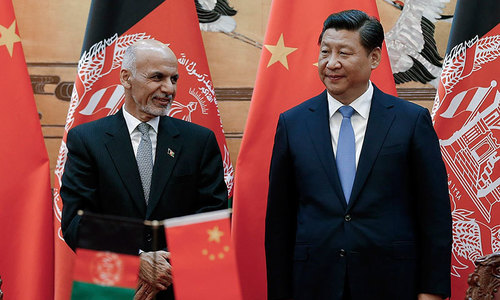WASHINGTON: US Defence Secretary James Mattis told a congressional panel late on Monday that the Trump administration’s Afghan policy would also look at impact of the rivalry between Pakistan and India on the situation in Afghanistan.
Mr Mattis said he would present the new policy to President Donald Trump “very soon” and it would include options to enhance US military presence in Afghanistan.
The defence secretary said it was important to have a regional approach to Afghanistan because it could have far-reaching ramifications not just for the war on terror but security for South and Central Asia.
US not winning war in Afghanistan right now, admits Pentagon chief
“We’re taking a regional approach to this,” he told the House Armed Services Committee. “We’re looking at everything from the situation between India and Pakistan, Pakistan and Afghanistan; obviously Iran and that whole South Asia area.”
Mr Mattis said the “regional strategy” would be “connected to the geographic reality of where this enemy is fighting from. As you know, it’s not just from Afghanistan”.
The US media interpreted this as a reference to earlier US claims that the Taliban, particularly the Haqqani network, were still using sanctuaries in the Federally Administered Tribal Areas (Fata) to launch attacks in Afghanistan.
Pakistan strongly rejects the allegation, saying that it has eliminated all terrorist sanctuaries in Fata and the Haqqani network has now moved to Afghanistan and is using its bases there to plan and execute attacks.
But Secretary Mattis insisted that focusing on Afghanistan alone would not end the decades-old fighting that has torn apart that country. “If we look at it [Afghanistan] in isolation, we’ll probably have something that’s lacking in some area,” he said.
“We are going to have to recognise that problems that come out of ungoverned spaces like that as we experienced on 9/11... do not stay there. They can come home to roost here.”
This was apparently a reference to the Taliban-led Afghanistan, which sheltered Osama bin Laden and other Al Qaeda members who orchestrated the Sept 11, 2001 terrorist attacks in the United States.
Mr Mattis, a retired four-star general, said the policy he would send to President Trump would include a proposal to send more US troops to Afghanistan amid the worsening violence. But he rejected as “wild fantasy” a media report that the Pentagon might propose sending up to 50,000 additional troops. The proposed increase, he said, would be nowhere near that number.
Most media reports, however, suggest that the new strategy would recommend sending 5,000 to 10,000 additional troops.
Mr Mattis told the panel that just under 10,000 US troops were currently stationed in Afghanistan. “The commander on the ground has asked for more,” he said. “Those discussions are ongoing now with the president.”
Although the United States is also asking its Nato allies to send more troops to Afghanistan, Mr Mattis said that even after the suggested addition, the “bulk of the fighting” would continue to be carried out by the Afghan forces.
AFP quoted the Pentagon chief as saying that the Taliban were “surging” in Afghanistan.
The “Taliban had a good year last year; they are trying to have a good one this year. Right now I believe the enemy is surging”.
“We are not winning in Afghanistan right now. We will correct this as soon as possible,” he added.
Published in Dawn, June 14th, 2017














































